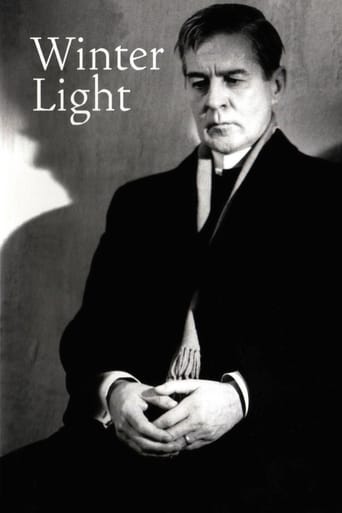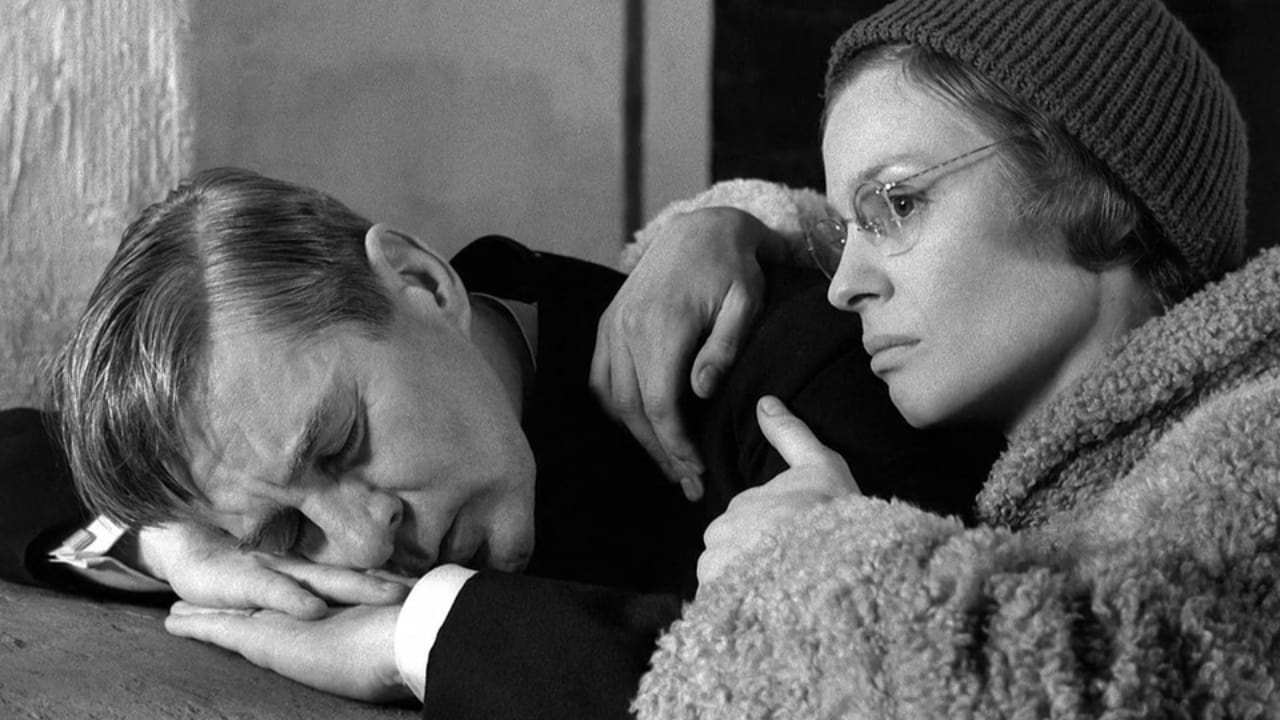Leray97
When thinking about faith among the people during the previous century, it's hard to picture individuals who bear a firm skepticism towards the existence and significance of God, since it was such a big driving force for the majority. Ingmar Bergman is one of these skeptics, as he uses Winter Light to detail a pastor's deep disbelief towards God's existence. It's easy to imagine a non-believer simply claiming that (within the context of faith) good people aren't rewarded, bad people do not suffer, and that most of the famous religious principles are just built around a false sense of hope. Bergman avoids this trope; by portraying the sheer amount of torment that the pastor's conflicted feelings bring him, the audience is forced to think a little harder on how much of a detriment it is for the faith in God to be able to sedate so many people in a growing world. There are times during the film where the differences between religious principles and reality are just spelled out, and this helps so much in reinforcing the danger in blind belief. This concept heavily dawns on the pastor, since he also can't look to love as a proof of God's existence anymore."The silence of God" is one of the film's major themes. This was something I really liked, since the question of "God, where are you?" (or anything along those lines) has plagued so many believers for as long as religion has existed. The silence itself can be hard to cope with but it can lead to a feeling of acceptance, as shown in the film. I would like to think of it as a form of submission but at that point, what else can anyone do about it? Just my two cents.I find that the acting in old movies can be difficult to judge, because I can't always tell if the performances are so realistic, or so good that they're real. Either way, Gunnar Björnstrand (the pastor) blows it out of the water here. Winter Light showed me that he's an actor who knows the balance between traditional dramatic acting and emoting without verbalizing. Björnstrand portrayed the internal struggle of his character so well that I really sympathized and related with him. Ingrid Thulin (the schoolteacher) is also great in this film, as she gives a couple gut-wrenching performances here and there. It helps that Winter Light doesn't completely obey the traditional film structure. Long takes, extended dialogue/monologue scenes; these are the things that emphasized the talent between these two individuals. There's a sequence where Thulin's character is talking directly to the camera for about five minutes or so. Where else are you going to see that? How often in film does that even happen? Bergman completely puts aside the feelings of the audience and forces us into that moment to absorb everything.I'm not very knowledgeable when it comes to religious type of films because I haven't watched that many and I'm also not a religious person. Though in trying to label Winter Light as a purely religion-based movie, it should also be noted that this is one of Bergman's projects where he drew aspects from his own life during its creation. The fact that this film feels very personal only adds on to the effect it had on me. In the end, I really enjoyed how cold and "real" it was. Just like The Seventh Seal, this Bergman title achieves a lot despite its short runtime, while still retaining its cinematic values.
daveedrenaud
I saw this film again recently. The first time I watched it I was more taken with the scene of Max von Sydow, when he visits the priest. I was amazed how the priest confirms his Godless suspicions. I think the original title of this film is God's Silence and this goes with the movie around that point. The English title is Winter Light, and that is a more optimistic title, perhaps they needed that for American audiences? Nevertheless, the film does have a positive ending. I don't want to spoil it by saying how, but it's not all dark and hopeless as you go through long sequences of despair with broken relationships and characters struggling with their relationship or understanding of the existence of God. I think that if you're a deep person that's asked yourselves these questions in the past or presently, then you would relate to this film. Otherwise if you don't care about these big questions, then you probably won't care about this film either. Ingmar Berman deals with these questions in many of his other films too such as Seventh Seal, but here he does so in a different way, with this priest. I prefer this take because it's less theatrical.
Kirpianuscus
about faith and solitude. about the search of sense and about ambiguity of love. the Bergman's atmosphere. and one of the most interesting performances of Gunnar Bjornstrand. a film about vulnerability and need of the other. about search of the other as answer to the cold circles who defines each character. a film about a long and bitter, cruel and strange fight. hopeless, absurd, who preserves the large themes from the filmography of director but, in the same measure, it represents a different image about the old / new looking for the essence who saves the people. a special film because the fight from the other films by Ingmar Bergman has new nuances. the close - up use, the religious crisis, the impossibility to love in the right manner, the dialogs are new forms of salvation. a film as window to a small part from the viewer's universe.
Jackson Booth-Millard
This was one of many Swedish films I founded from director Ingmar Bergman (The Seventh Seal, Wild Strawberries, Persona, Cries and Whispers, Fanny and Alexander), from being listed in the book 1001 Movies You Must See Before You Die, so I watched hoping I would agree with this opinion. Basically pastor Tomas Ericsson (Gunnar Björnstrand) performs his usual Sunday service to a tiny congregation in the small rural church, but the cold winter weather has given him a cold, and unknown to others he is also suffering a crisis of lack of faith in God, following the death of his wife two years ago. After the mass Tomas is approached by Karin Persson (Gunnel Lindblom), and her fisherman husband Jonas Persson (Max Von Sydow) who is suffering from anxiety due to China having a bomb and he is contemplating suicide, but rather than consoling him Tomas cannot help but talk about his own troubles, and later Jonas kills himself with a rifle shot in the head. School teacher Märta Lundberg (Ingrid Thulin) is in love with Tomas and offers her desperate feelings as a consolation for the loss of his faith, but the widowed priest resists and rejects her with bitter and tough words, and in the end Tomas finds someone to talk to about his lack of faith, and what he believes with regard to the true suffering of Jesus Christ in the Passion of Christ. Also starring Allan Edwall as Algot Frövik and Kolbjörn Knudsen as Knut Aronsson. I can agree with the three stars out of five that this film is given by critics, it is engaging to see the man struggling to remain faithful during the cold season, and the refusal of love from one who has true feelings is intriguing, but it is perhaps one of those films that only half watching will like or understand, it is certainly an interesting drama. Worth watching!


 AD
AD



